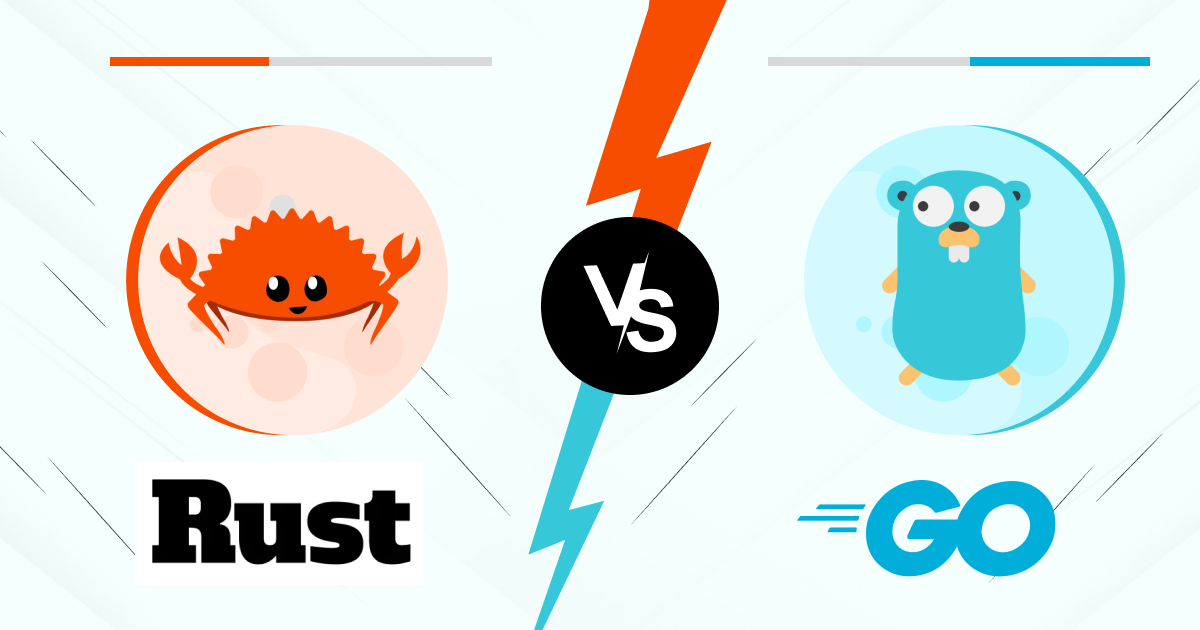In the last few years, performance has become the most important part of software engineering, and companies are moving to high-performing languages that can provide awesome execution speeds and safety to their code. Two such popular languages are Rust and Go. Both these languages are far ahead of their peers, but what happens when you compare them head to head? In this article, we will explore both these languages and compare them head to head to find out which of these modern languages is good for your use case.
Rust

Rust was created and open-sourced in 2006 by Graydon Hoare, who was an ex-Mozilla employee. The idea behind the development of this language was to provide a language that is strongly focused on memory safety and provides almost the same performance as low-level languages.
With a brief background on the Rust language, let’s look at some of its core features in the next section.
Core Features of Rust
- Memory Safety
Rust is known in the development world for its memory safety approach. While it does not use any garbage collector, it uses a unique ownership model that keeps memory issues at bay and runs the program nicely.
- High-performance
Rust can create highly compact compiled executables for your code that can provide high performance. It also uses LLVM to optimize your code for different runtime environments so that the performance is stable across environments and platforms.
- No Garbage Collector
Unlike other programming languages that use a garbage collector, Rust is designed differently, and it does not require a garbage collector. It uses a system of ownership and borrowing, which smartly identifies memory management opportunities and does not require a garbage collector.
- Strong Type System
Rust has a strong type system and memory management approach that can catch errors during compile time and also provide pointers on how to solve those errors. This strong type of system can also prevent runtime memory leaks and racing conditions in concurrent environments.
Go

Go is a programming language created at Google, which was later open-sourced in 2009. One of the lead creators of this language was Ken Thompson, who is also known as the man behind the Unix operating system. Go is statically typed, and it was developed to overcome difficulties associated with C++ for large-scale usage. Go also takes a lot of its syntax inspiration from C++, but it is much simpler than C++, too.
Before we dive into a comparison between Rust and Go, let’s take a look at some features and Advantages of using Golang for your web application.
Core Features of Go
- Concurrency
Go was created to overcome concurrency issues in C++, and it is often the best when it comes to concurrency. It comes with built-in go-routines, which make concurrent executions much simpler and easier for Golang developers without the need for any overhead. This concurrency also helps you serve multiple requests at a time and makes network operations easier.
- Simplicity
Go is known for its simplicity, and it has a moderate learning curve which is driving its adoption. The syntax is a combination of C++ and Python, which makes it easier for new developers coming from both backgrounds to adopt the language.
- Faster Compilation
Unlike Rust, Go has a much faster compiler, which compiles your Go code into executables and binaries faster. The faster compiler also makes development faster as developers don’t have to wait for a long time to compile the code and test changes. Moreover, the Go compiler is designed so that programs written in older versions can easily compile and run on new Go compilers.
- Static Typing
Go comes with static typing which ensures that your code compiles accurately, and there aren’t any datatype issues. This static typing feature also makes it easier and faster to debug the code through better type definitions and error logs.
Having known about both of these languages and their core features, this is the perfect time to do a head-to-head comparison of the two languages. In the next section, let’s compare these languages and find out which one is better based on use cases.
Comparison Between Rust and Go
- Performance
Rust and Go are both compiled languages, and they aim to improve performance wherever they are used. Being developed at Google, Go was created as an alternative to C++, which could concurrently execute code on multi-core CPU architectures.
According to research by benchmark games, Rust is at least 3 times faster than Go in execution speeds, and it can be as much as 2x more memory efficient in some cases compared to Go. Rust achieves such high-performance figures due to its ownership system and lack of garbage collectors. So, if your aim is high performance without any compromise, you should choose Rust over Go.
- Memory Management
By design, Rust and Go are memory-safe and efficient languages. These languages are pretty good at preventing memory leaks and overconsumption of resources. However, both these languages handle memory management differently.
Rust does not come with a garbage collector, and it relies on an ownership and borrowing system that frees up memory once a variable moves out of context. Compared to this, Go comes with a powerful garbage collector that frees up unused memory during program execution to keep resource usage minimal.
- Safety and Reliability
When writing large-scale production applications, the safety and reliability of the language can play a big role in your choices. No one likes to encounter null pointer errors or memory errors in production applications, which can cause entire systems to break.
In Rust, safety is ensured through ownership and borrow checker. Whenever you assign a variable to any new variable or pass it to a function, the variable becomes inaccessible in the current context, and it is only accessible in the passed function or as the new variable. This removes the need for garbage collection and ensures memory safety in the application, as there aren’t two instances of the same variable in memory.
Compared to this, Go implements exceptions as errors, which can be used to handle errors gracefully. By making exceptions as errors, Go also ensures that your applications don’t stop abruptly — a crucial aspect to understand when defining the Roles and Responsibilities of Golang Developer, especially in building reliable and error-resilient systems.
- Learning Curve
The learning curve plays a big role in the adoption of a language. As the learning curve becomes steeper, developers need more time to understand the language and use it correctly.
Rust has a steeper learning curve than Go, as it comes with a lot of new concepts and advanced features that aren’t found in many other modern languages. Due to this, it is harder to master this language in a short period and implement features quickly.
Compared to Rust, Go is much easier to learn due to its syntax being similar to C++ and Python.
Final Thoughts
In the end, you know the features of both Go and Rust at this point, and it is good to make a choice, too. If you want unbeatable performance and memory-safe applications that can take some time to build, you should choose Rust. But if you aim to get good performance without a steep learning curve and a bigger ecosystem, you should select Go for your codebase.







